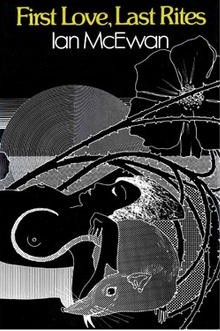Inspiring Older Readers
 posted on 22 Jul 2025
posted on 22 Jul 2025
Rereading First Love, Last Rites by Ian McEwan
Fifty years ago this year Ian McEwan’s first book was published – a collection of eight short stories called First Love, Last Rites. In 2015, a fortieth anniversary edition was published and there was some coverage of this in the media, including an interview with McEwan in The Guardian in which he spoke – quite revealingly in some ways – about the circumstances in which he wrote the stories. There doesn’t seem to have been any similar marking of the fiftieth anniversary of the book this year so I thought I would try and do that here.
By his own account, McEwan started writing these stories in 1970 when he was still a student, working for an MA in English Literature at the University of East Anglia (UAE). He was living in lodgings in Norwich, in ‘a pleasant room on the edge of the city’ – but you would never gather this from the stories. They are dark, macabre, grotesque, even transgressive stories, peopled with loners and misfits, and they involve child abuse, incest, murder, sexual perversity, extreme animal cruelty.
Almost as soon as he began to write, McEwan has said, he experienced a kind of compulsion: ‘[w]ithin an hour, a strange voice was talking to me from the page. I let it speak,’ he has said. ‘Other strange voices, other weird or wretched characters, surfaced in that year to haunt or infest my fiction. Violent, sexually perverse, lonely, they were remote from the life I was living in Norwich […] and yet whenever I returned to my notebook or typewriter, a savage, dark impulse took hold of me.’ He was working feverishly, it seems, an involuntary conduit for some of the most disturbing voices and characters that would ever appear in his fiction.
If you are unfamiliar with these stories then let me say that they really are as strange, as grotesque, as dark and disturbing – and yes, at times as disgusting – as this account might suggest. Early reviewers were vociferously divided – many as scandalised by the casual, even gratuitous perversity of the stories as they were impressed by this glittering and transgressive new talent.
In the same Guardian interview – I think much of it in fact comes from McEwan’s foreword to the fortieth anniversary edition of the stories – he goes to some lengths to explain that he would of course approach such stories very differently now, and perhaps not at all. Fiction in the 1970s, he claims, was much more diverse and risk-taking and no one – not his friends nor his professors at UAE, the novelists Malcolm Bradbury and Angus Wilson – claimed to be shocked by these stories; they merely asked for more. But now, he says, we live in a more censorious climate, albeit not necessarily a more informed one: we are neither more puritanical nor more liberated, but we are ‘profoundly confused’. I’m not sure I quite go along with this analysis and I think in any case the passage of another decade since McEwan made these remarks also has to be taken into consideration.
Anyway, let us – with some difficulty – put aside the merely ‘shocking’ aspect of McEwan’s earliest stories and consider them on their merits as fiction. Well, I think this may be the third time I have read some of them and I was somewhat surprised to find that I don’t think my view has changed all that much. At their best, they are accomplished, even bravura performances, though their influences are fairly evident, I think: Paul Theroux, Martin Amis, William Burroughs, and perhaps Hubert Selby are all amongst the highbrow influences, but I think Roald Dahl – or a sort of Roald Dahl on steroids – is also in there, especially in the very enjoyable Solid Geometry. But they are also very uneven and at least a couple of them simply don’t really work as stories.
McEwan has spoken of deliberately leaving any moral judgement in the stories solely up to the reader. ‘My amoral first-person narrators especially were supposed to be condemning themselves out of their own mouths. I thought it was more interesting for the author not to intervene.’ But he has also said that ‘it was difficult for me then, and would be even more difficult now, to persuade readers that my intentions were actually moral’.
But in saying this McEwan I think manages to imply that the failure lies with us, his readers, whereas it seems to me now that most of the stories fail not because of some courageous complexity of moral vision but because they are simply not good enough. They are clever but essentially hollow apprentice works which have not lost their power to shock and disturb and but for the fact that they are the first published utterance in what would become one of the great literary careers of the past half-century probably wouldn’t merit very much attention. Whether I shall be returning to them yet again in the future remains to be seen.
Alun Severn
July 2025
Ian McEwan elsewhere on Letterpress:
Rereading Ian McEwan’s On Chesil Beach
Machines Like Me by Ian McEwan
My Purple Scented Novel by Ian McEwan
Ethical dilemmas dominate in Ian McEwan’s latest novel, 'The Children Act'
The Cement Garden by Ian McEwan
Considering Ian McEwan’s The Children Act…again
Rereading Ian McEwan’s Saturday